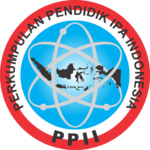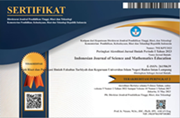Mathematics Learning Performance: Its Correlation with Chemistry Learning Performance
Abstract
Mathematics is a rigorous, logical, and instrumental subject. Many concepts in chemistry learning is inseparable from mathematics. This study aims to determine the relationship between student learning performance in learning mathematics and chemistry. This research adopted literature analysis, statistical analysis, and interview (from subjective and objective aspects). The data of this study used the mathematics and chemistry scores of 452 students from 6 third-level grades at a secondary school in the city of Guilin. SPSS22.0 software was used to analyze comprehensive data in exploring the correlation between math scores and chemistry scores from various perspectives. Then, several students were interviewed to verify the results of the data analysis from emotional perspectives. The results of the research objectively indicate that there is a strong positive linear relationship between students’ mathematics learning achievement and subjectively, students agree that good mathematics performance can improve chemistry scores. Accordingly, mathematics learning performance is related to chemistry learning performance. Teachers can strengthen chemistry knowledge through mathematical knowledge. So, it is recommended that teachers adopt and use appropriate teaching strategies, and strengthen the application of mathematical knowledge in chemistry learning.
Keywords
Full Text:
PDFReferences
M. P. Martin-raugh et al., “Investigating the Relevance and Importance of Mathematical Content Knowledge Areas for Beginning Elementary School Teachers,” Meas. power Learn., no August, 2016.
Y. . P. Pereira, J.; Wijaya, T.T.; Zhou, “Learning points, lines, and plane geometry with Hawgent dynamic mathematics software,” 2020.
S. Högskola and L. E. Turner, “Cultivating a research imperative : Mentoring mathematics at,” Hist. Math., vol. 50, pp. 50–83, 2020.
M. M. Thomson, J. E. Turner, and J. L. Nietfeld, “A typological approach to investigate the teaching career decision: Motivations and beliefs about teaching of prospective teacher candidates,” Teach. Teach. Educ., vol. 28, no. 3, pp. 324–335, 2012.
K. C. de Berg, “Using the Origin of Chemical Ideas to Enhance an Understanding of the Chemistry of Air: Issues and Challenges for including mathematics in the teaching and learning of chemistry,” Educ. Quim., vol. 23, pp. 265–270, 2012.
J. C. Adigwe, “Effects of Mathematical Reasoning Skills on Students ‘ Achievement in Chemical Stoichiometry,” Rev. Educ. Inst. Educ. J., vol. 23, no. 1, pp. 1–22, 2013.
K. Bain, J. M. G. Rodriguez, and M. H. Towns, “Chemistry and Mathematics: Research and Frameworks to Explore Student Reasoning,” J. Chem. Educ., vol. 96, no. 10, pp. 2086–2096, 2019.
G. Russell, “Philosophies of Mathematics,” Transreform Radic. Humanism, pp. 123–179, 2017.
S. Celik, “Chemical literacy levels of science and mathematics teacher candidates,” Aust. J. Teach. Educ. vol. 39, no. 1, pp. 1-15, 2014.
K. C. De Berg, “Using the Origin of Chemical Ideas to Enhance an Understanding of the Chemistry of Air : Issues and Challenges for including mathematics in the teaching and learning of chemistry,” áreas emergentes la Educ. química, pp. 1–6, 2012.
V. J. Wong, “The relationship between school science and mathematics education,” 2008.
J. Vigo-Aguiar and E. J. Brändas, “Mathematical and computational tools in theoretical chemistry,” J. Math. Chem., vol. 48, no. 1, pp. 1–2, 2010.
U. Udousoro, “The Effects of Gender and Mathematics Ability on Academic Performance of Students in Chemistry,” African Res. Rev., vol. 5, no. 4, pp. 201–213, 2011.
M. Effiong, U. Theresa, and M. Udofia, “E ffects of mastery learning strategy on students ‘ achievement in symbols , formulae and equations in chemistry,” J. Educ. Res. Rev., vol. 2, no. May, pp. 28–35, 2014.
İ. Güneş, Z. Özsoy-Güneş, Y. Derelioğlu, and F. G. Kırbaşlar, “Relations between Operational Chemistry and Physics Problems Solving Skills and Mathematics Literacy Self-efficacy of Engineering Faculty Students,” Procedia - Soc. Behav. Sci., vol. 174, pp. 457–463, 2015.
M. Van Namen, A. Powers, and C. Snow, “Using Thinking Maps to Develop Higher Order Thinking Skills among Diverse Learners,” Int. J. Educ. Hum. Dev., vol. 3, no. 2, pp. 52–58, 2017, [Online]. Available: www.cgrd.org.[Accessed: 10-Jul-2021]
İ. Güne, Z. Ö. Güne, Y. Derelio, and F. Gülay, “Relations between operational chemistry and physics problems solving skills and mathematics literacy self-efficacy of engineering faculty students,” vol. 174, pp. 457–463, 2015.
J. Pereira, T. Jianlan, T. T. Wijaya, A. Purnama, H. N., and M. Tamur, “Using Hawgent Mathematics Software to Help Primary School Students to Read Clocks,” J. Phys. Conf. Ser., vol. 2049, pp 1-7, 2021.
N. Gultepe, A. Y. Celik, and Z. Kilic, “Exploring effects of high school students’ mathematical processing skills and conceptual understanding of chemical concepts on algorithmic problem solving,” Aust. J. Teach. Educ., vol. 38, no. 10, pp. 106–122, 2013.
F. a Adesoji and T. L. Ibraheem, “Effects Of Student Teams-Achievement Divisions Strategy And Mathematics Knowlegde On Learning Outcomes In Chemical Kinetics Dr. Francis A. ADESOJI Dr. Tunde L. IBRAHEEM,” Soc. Res. (New. York)., vol.2, no. 6. pp 15-25 , 2009.
P. J. Barham, “An analysis of the changes in ability and knowledge of students taking A-level physics and mathematics over a 35 year period,” Phys. Educ., vol. 47, no. 2, pp. 162–168, 2012.
Brown GTL, “Doctoral Education in Quantitative Research Methods : Some Thoughts about Preparing Future Scholars,” vol. 3, no. Article 25, pp. 1–12, 2017.
F. Puteh, M. Hanafi, and B. Azman, “Quantitative Data Analysis : Choosing Between SPSS , PLS and AMOS in Social Science Research,”, 2017.
V. Vargas et al., “ScienceDirect Methods for the study of near , intermediate vision , and accommodation : an overview of subjective and objective approaches,” Elsevier Surv. o p hthalmology, vol. 64, no 1, pp 90-100 2018.
B. J. E. Rockoff, C. Speroni, S. G. Rivkin, and J. Kain, “Subjective and Objective Evaluations of Teacher Effectiveness Author ( s ): Jonah E . Rockoff and Cecilia Speroni Source : The American Economic Review, PAPERS AND PROCEEDINGS OF THE One Hundred Twenty Second Annual Meetin,” Am. Econ. Assoc., vol. 100, no. 2, pp. 261–266, 2010.
Y. Li, M. Yang, and Z. Zhang, “A Survey of Multi-View Representation Learning,” IEEE Trans. Knowl. Data Eng., vol. 31, no. 10, pp. 1863–1883, 2019.
Mari, J.S. Effective teaching strategy to enhance meaningful learning of the mole concept. STAN Chemsitry Panel series 3, 2008.
West African Examination Council, May/June Senior School Certificate Examination Chief Examiner’s Report, Lagos, 2008.
Offiah, F.C. and Samuel N.C.Effects of teaching Relevant mathematical topics in Chemistry in Udofia, N. (ed). Proceedings of the 49th Annual Conference of STAN, 2008.
Offiah, F.C. and G.B. Njelita, Use of prerequisite mathematical concepts in teaching stoichrometry. STAN chemistry Panel series 5, 2010.
Madichie, J.C. and Isreal, I.A. Teaching the Mole Concept in Chemistry using Analogy of Numbers. STAN chemistry panel series 5, 2010.
Doka, M.G. Effective techniques for writing correct Inorganic chemical formulae and Equations in Olayiwola. A.A. and Umoh, S.A. (eds). Effective Methods for teaching Inorganic Chemsitry Science Teachers Association of Nigeria: Ibadan, 2010.
Zhang, L.F., & Watkins, D. Cognitive development and student approaches to learning: an investigation of perry’s theory with chinese and us university students.Higher Education, 41, 2001.
Erdemir, N., Determining students’ attitude towards physics through problem-solving strategy, Asia Pacific Forum on Science Learning and Teaching, Asia-Pacific Forum on Science Learning and Teaching. vol 10. no2, pp 1-4 2009.
DOI: http://dx.doi.org/10.24042/ijsme.v5i2.12075
Refbacks
- There are currently no refbacks.
Copyright (c) 2022 Unit Riset dan Publikasi Ilmiah FTK UIN Raden Intan Lampung

This work is licensed under a Creative Commons Attribution-ShareAlike 4.0 International License.

Indonesian Journal of Science and Mathematics Education is licensed under a Creative Commons Attribution-ShareAlike 4.0 International License.




